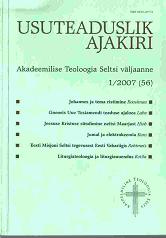Evangelisatsioon kui kommunikatsioon: religioonisotsioloogiline vaatlus krusaadi Pro Christ näitel
Evangelization as Communication, Observations in Sociology
Author(s): Ingmar KurgSubject(s): Christian Theology and Religion
Published by: Akadeemiline Teoloogia Selts
Keywords: Missiology
Summary/Abstract: Evangelization, as defined in the document Mission and Evangelization in unity today issued by the World Council of Churches, „...focuses on explicit and intentional voicing of the gospel, including the invitation to personal conversion to a new life in Christ and to discipleship”. Evangelization, understood in the light of the aforesaid, refers to the indispensable need of religious communication. The contact between the proclaimer and the listener is thereby interactive – it cannot remain an one-sided monologue but has to take place in an open communicative system. According to the definition of communication theory presented by the sociologist Niklas Luhmann, communication is considered to have taken place only when understanding of the conveyed message and acceptance by the receiver has occurred in the process. The ability of conveying a message and mediating symbols in an understandable and acceptable way should be part of the church competences in present-day evangelization. The specific feature of communication occurring in evangelization lies in the fact that the message is conveyed provocatively: by using the concept frame extension – in the context of the sociology of religion – the aim of the act of evangelization is to shift the communication frames into a position where it would be possible to motivate and mobilise the potential person entering the communication space. On the example of the evangelization event Pro Christ (based on the analysis of the sociologist of religion Detlef Pollack) it will take place in three stages: a) building up communicative bridges between the evangelist, his message and the listener while inhibiting other, unnecessary communication possibilities in the process of evangelization; b) intensifying the communication, the end result of which is affirmation, conversion and a new group-specific socialization; c) rendering meaning to the communication by encompassing person’s whole life-story which has complex religious features as well as re-orientation of all other everyday relations in the light of the gospel of God. Churches that participate, willingly or not, in the present-day „market” of religions can test their competence in the area of evangelization by the fact whether the search for contact initiated by them is transparent for the person receiving it, whether it is allowing free acceptance as well as creating an on-going interactive and social communication.
Journal: Usuteaduslik Ajakiri
- Issue Year: 2008
- Issue No: 1 (57)
- Page Range: 65-83
- Page Count: 19
- Language: Estonian

